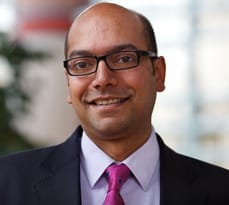In the West, business innovation is often the preserve of well-funded, in-house R&D (research and development) departments, sometimes working within corporate hierarchies that threaten to slow or stifle innovation altogether. That’s emphatically not, says Cambridge Judge Business School’s Professor Jaideep Prabhu, Director of the Centre for India and Global Business, how innovation happens in India, China and emerging economies.
His groundbreaking 2012 book Jugaad Innovation (co-authored with consultant Navi Radjou and media strategist Dr Simone Ahuja) documents this alternative approach to innovation – and now it is inspiring major businesses and NGOs.
Prabhu’s journey began 5 years ago, when he returned to Cambridge Judge Business School to take up the Jawaharlal Nehru Chair in Indian Business and Enterprise. The move prompted him to start thinking about innovation in emerging economies. What began as an attempt to aggregate research on the subject from across the Business School and the University of Cambridge, and to engage with Indian businesspeople and politicians, rapidly evolved into an intense schedule of observational study trips. What Prabhu learned on those trips would permanently change the way he thought about innovation.
“There was something unique about how I saw innovation being done in India as opposed to R&D departments in Western companies,” he explains. “Frugal, flexible, inclusive. These are the qualities, and the Indian word jugaad is the concept we borrowed to try and capture them: the art of overcoming harsh conditions by flexible innovation.”
What does this mean in practice? Jugaad innovation can be seen in the ECG machine portable enough to travel in a doctor’s bag (its compact size thanks to its utilisation of a bus-ticket printer and a telephone keypad) and in the £200 baby warmer that requires no electricity and provides the most vital support for a premature baby at one hundredth of the cost of an incubator.
And thanks to Professor Prabhu’s work, jugaad is being adopted by leading organisations around the globe. BRAC is the largest non-governmental development organisation in the world. Founded in Bangladesh in 1972, today it is active in countries such as Sierra Leone, Sri Lanka, Afghanistan and Haiti. Andrew Jenkins, of BRAC’s Research and Evaluation Department, says that the organisation “has benefited very much from the ideas and experience of Professor Prabhu and his jugaad innovation”.

One tangible outcome is an innovative programme intended to reduce disputes and related human rights abuse in Bangladesh by providing better land measurement services. Under Prabhu’s guidance, a Cambridge Judge Business School doctoral researcher and BRAC staff are implementing a scheme that will see trained land evaluators volunteer their services for free to assist Bangladesh’s poor who are most vulnerable to land conflict and disenfranchisement.
The programme, says Jenkins, has gone so well that another strand is being rolled out in relation to microfinance. Prabhu’s work “has opened up a new field of investigation for BRAC, which is helping us very much in improving the practical performance of innovative ideas and programmes”.
Back in the UK, Professor Prabhu has presented to the Royal Society of Medicine, whose members are interested in applying jugaad principles not only to the creation of devices and products, but also to delivery and processes, such as the use of mobile phones to reach remote communities. He has urged young designers at the Royal Institute of Mechanical Engineers to seek out jugaad solutions. This promotion of the jugaad approach will doubtless bring innovation in the future. But already actively working with Prabhu is one of Britain’s largest banks, Barclays, keen to apply principles that serve the unbanked of the developing world to its work supporting its British banking customers experiencing hard times.
“Barclays are very keen to be responsive to how customers have been affected by the downturn,” says Prabhu. “We’ve worked on a financial health programme to understand what’s behind the dropping-off of savings rates, and to find ways to help customers be more proactive about their financial health without scaring or boring them.”
Prabhu modestly suggests that the chief impact of his work thus far lies in “documenting and spreading the word about jugaad innovation, for other people to apply”. It will take years more for the full impact of that wider application to become apparent, he says. But it is evident that Prabhu and his ideas are instrumental in major programmes that are already making an impact, in Britain and abroad.


